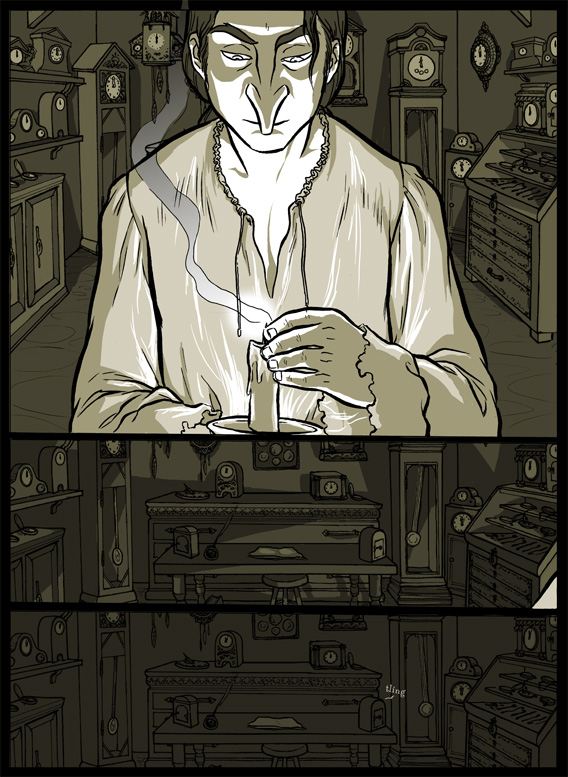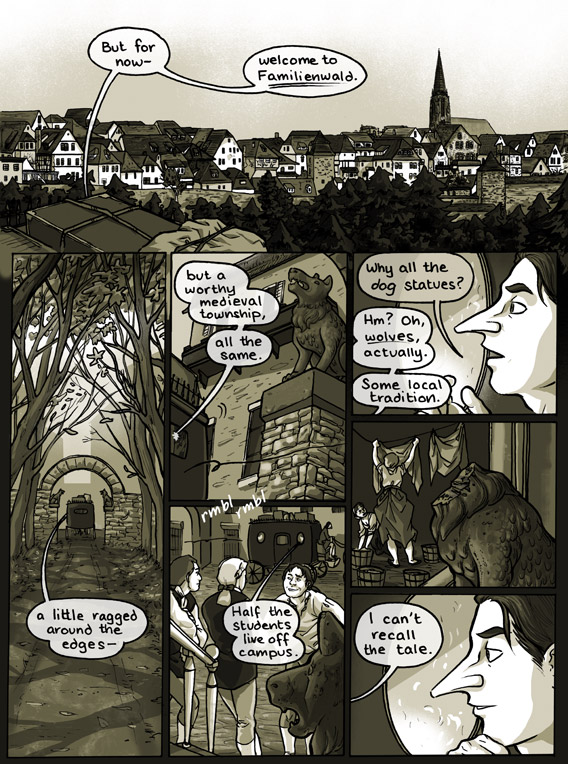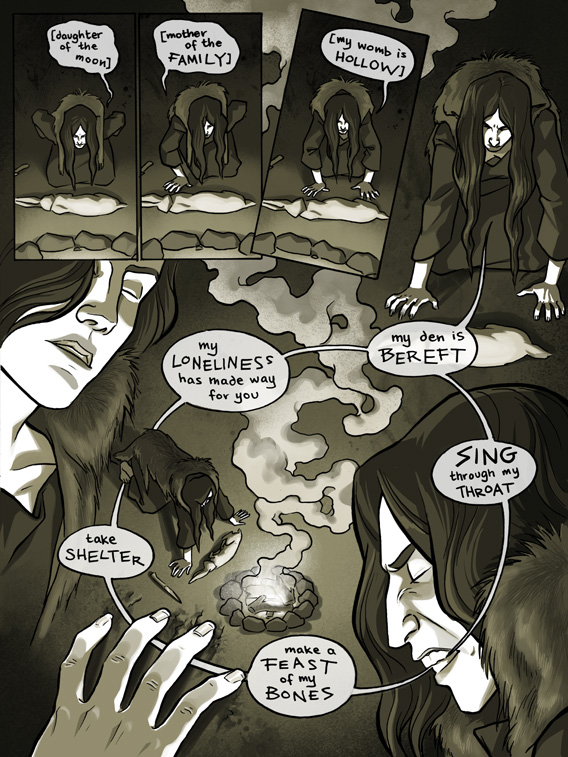From long-running soap operas to comedy-drama slices of life to daily gag strips, the digital comics scene has exploded over the last decade and readers have never had more options. Feeling overwhelmed? Jen Overstreet and Joe Stando are here to take you on an expedition through the webcomics wilderness and show you the best specimens in our monthly Deadshirt Webcomics Field Guide.
From its artwork, radiating out through its website design, Dylan Meconis’s Family Man is cast in cold sepiatone. The limited color scheme provides the trappings of an “antique” tale, a quick visual shorthand for the old-timey. But it also reflects restraint, the tangible self-control by which the main characters of the story operate.
Family Man begins in 1768, in what is now Germany, during the burgeoning Age of Reason. Luther Levy is a young scholar, a theologian, a Jewish Christian and most recently, an atheist. In the process of losing his faith he has found himself rejected from University and his doctorate. As he struggles to determine his next course and source of income, a fellow academic shows up in town with an unlikely job proposal. Soon, the disgraced scholar is on his way to the University of Familienwald, far out the outskirts of the German territory, to take up a position as an assistant lecturer for the Rector himself.
All the while, blood-stained asides packed with images of wolves and moons bookend chapters of the story. What could possibly be awaiting Luther in this town stranded in the woods?
Luther’s story is thick with philosophical reference. An open tab to the extensive notes section of the site would not go amiss for readers less familiar with Enlightenment thought or the many permeations of European Christianity, who still want to get at the subtleties of Luther’s worldview. However, even if you don’t have time for some background reading, the broad emotional strokes can be inferred through Meconis’s artwork and tone. Besides, the sense that the academic world Luther navigates is extremely navel-gazing in its’ intrigues rapidly becomes essential to the story. Luther struggles to survive in circles of intellectual power while harboring heretical opinions, yet the whole world he struggles to find a foothold in floats so high above worldly concerns that it teeters on the edge of irrelevance.
Upon arriving at Familienwald, Luther makes short work of beginning an ill-advised romance with the mysterious, intellectual guardian of the university’s impressive library, Ariana Nolte—the Rector’s daughter. Her secrets have depths unimagined by the men seeking truth in books and lectures. The story begins to shift to her point of view, and we learn more about the earthly concerns and old powers that surround the University’s temple of modernity.
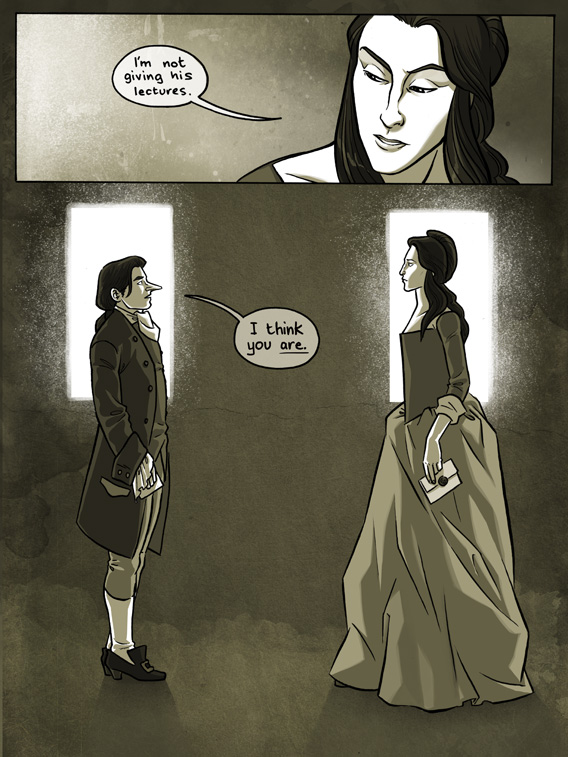
Meconis’s artwork is as richly detailed as her theological references. Intensely detailed environments come standard. Her naturalistic figures, peppered with wrinkles, rolls, and body hair, heighten the otherworldly story’s grounding in historical reality. Deep, moody shadows intensify drama and illuminate the pale characters, while the near-perpetual darkness the artwork looms out of helps to focus attention on the important pieces of the scene. Panel structure constantly morphs to underscore movement and intensity.
Both Luther and Ariana sit as outsiders, debating their allegiance to the world of knowledge while working intently just to be included in a system that others them. Luther knows nothing but that world, yet exists outside of the fold due to his Jewish father. He both covets and rejects academia’s respect. Ariana is torn between her her work in the library that receives neither recognition nor reward beyond the intellectual sustenance it supplies her, her sisterhood and freedom in the woods, and her duty to the parents who represent either option.
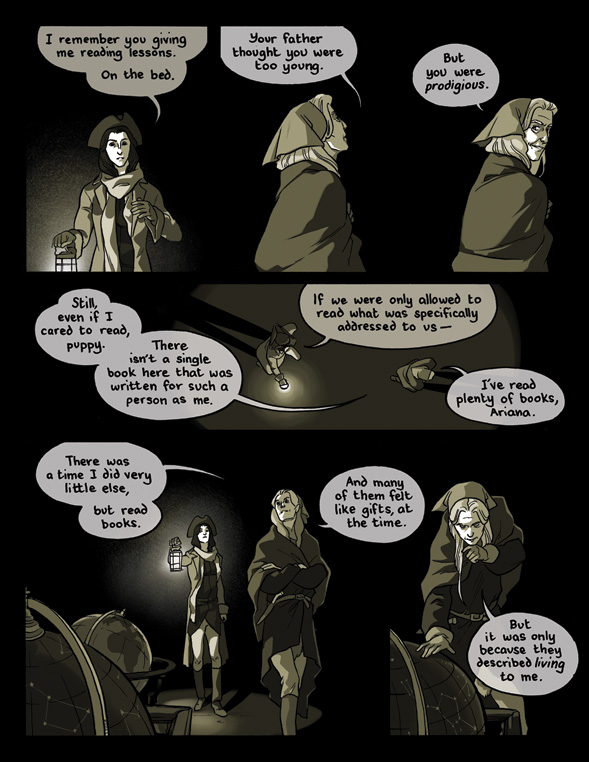
Like the gothic fiction it styles itself off, Family Man sets up a moral decision between mind and body, virtue and power, light and dark. A modern reflection on morality, class and gender roles brings delicious complications to muddy up those dichotomies. Expect the kind take on familiar monster lore that centrally incorporates questions brought up as nerdy feminist hypotheticals—what about menstruation, what about pregnancy?
Family Man is announced by its’ website banner as “A Graphic Novel” (which Meconis defines in the FAQ as a “long comic book with pretensions”). This definition is technically true as the comic is destined to be bound into 3 print novels. Beyond considerations of physical media though, the subtitle highlights that Family Man is a kind of story that is not often made available for free online. It is deeply researched, dense and subtle. Webcomics by their nature tend to sprawl off in unforeseen directions without the aim or necessity of reaching a conclusion, but Family Man is a carefully structured beast. It assures its readers that it knows where it’s going and it will be getting there soon enough.
Family Man updates on Fridays.

